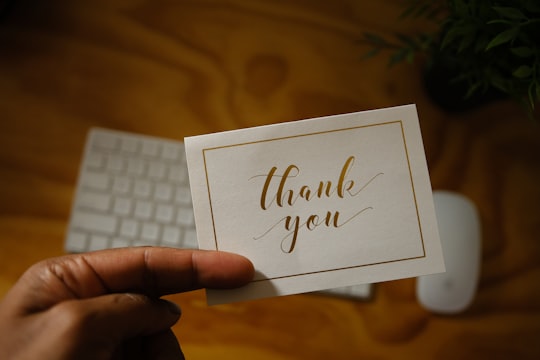
Just Say "You're Welcome"
Accepting gratitude is another way to help.
I’m not boasting when I say that I get a lot of thank you notes. It’s a common experience for anyone who teaches for a living. Students are naturally kind and many were raised on the idea of thanking their teachers. Also, when teaching at a university, we’re often asked for help by writing a recommendation letter or giving career advice. Students typically follow up with an email or note saying thanks.
My students will also sometimes apologize when asking for help, feeling guilty at the inconvenience they think they’re causing me. I have to remind them that helping students is my job, and I love my job. When students seek help from professors, they’re just getting their money’s worth. I’d much rather accept their thanks than fend off their apologies.
When Accepting Thanks Is Hard
You almost certainly have a typical response when someone says “Thank you.” There are, for new students of English, at least 16 different expressions to accept a person’s gratitude. You might also be surprised, like me, to learn that there’s controversy about the expression “You’re welcome.” (Such nonsense!)
But some of you—and you know who you are—recoil a bit when people express their thanks. For many, gratitude feels unnecessary because we see helping as expected behavior, not deserving any special recognition. For some it’s hard to accept gratitude because we don’t like feeling superior to others, and gratitude implies indebtedness. And for some gratitude causes serious discomfort because it conflicts with a poor self-image or sense of inadequacy. In this last case, being unable to accept gratitude could be a symptom of depression, OCD, or a similar mental health concern.
It might feel even worse when the gratitude is more than a quick thanks. Do you ever feel guilty when you get a thank you card or, worse, a gift?
Receiving Thanks Helps Them
If you have a hard time accepting thanks, here’s a wonderful reason to do it anyway: it helps the person thanking you.
The benefits of gratitude are abundant and extensively demonstrated in research. Gratitude practices make people happier and healthier. Grateful people have better social relationships. They even enjoy better sleep and immune systems. Gratitude is, in my opinion, the most effective-but-overlooked daily practice to improve your life.
Accepting gratitude helps with all of this, of course. The opportunity to express gratitude—in small or large ways—enhances our self-efficacy, a critical component of mental health. (Being thanked helps your self-efficacy, too.) We feel empowered when we can effectively and meaningfully express thanks to someone. It helps reduce our sense of unmet obligation and rebalances important relationships.
Refusing or deflecting thanks can temper or even ruin all of these benefits. It’s far more beneficial when we accept gratitude with grace. So next time someone extends their sincere thanks, help them out by accepting the offer. It’s just another way to help.



